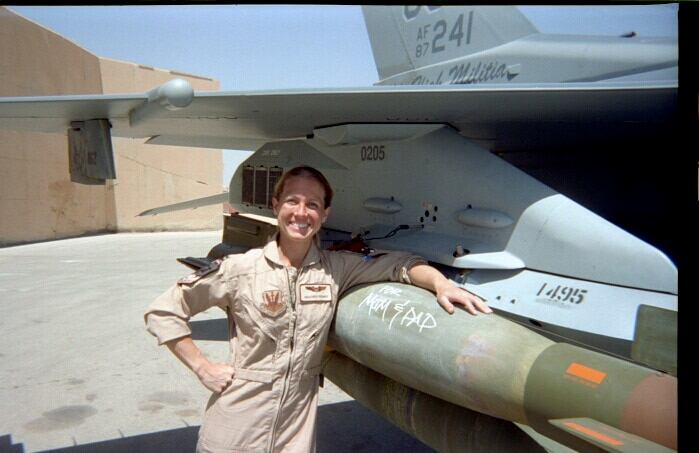Fifteen years ago on a sunny September day, civil aviation as we knew it changed, forever. So too did the lives of all Americans, as the horrifying spectacle of airliners crashing into the World Trade Center towers and the Pentagon made it obvious the world would never be the same.
On that day 25-year-old Heather "Lucky" Penney was a new first lieutenant serving as a training officer with the 121st Fighter Squadron of the District of Columbia Air National Guard, based at Andrews Air Force Base outside Washington. The first woman to serve in her ANG unit, she flew F-16Cs on training missions in preparation for combat. When the 121st received word of the second World Trade Center strike, and a half hour later the Pentagon was hit, it became clear the United States was under attack. With news of a fourth airliner possibly headed toward Washington, Penney and her wingman, Colonel Marc "Sass" Sasseville, scramble-started their F-16s and took off to intercept it.
Their mission was simple but sobering: Find the airliner and take it down by any means necessary. Since there had been no time to arm their F-16s, that essentially meant they would be flying a kamikaze mission, ramming their jets into the airliner. "I'm going to go for the cockpit," Sass told her. "I'll take the tail," Lucky replied.
Their flight path from Andrews took them over the Pentagon, and "there was no way to avoid seeing the smoke that was billowing out of the building," she said. "I didn't dwell on that because we had more important things to do." Penney described feeling disconnected from her emotions as she focused on the mission: "It was a completely surreal experience."

Now-Major Heather Penney poses with an F-16 Viper during one of her two tours in Iraq. (Courtesy of Heather Penney)
She and
Sasseville
headed northwest into Pennsylvania, searching for the airliner but careful not to go too far. "We went out as far as Sass thought was reasonable to ensure that we had sanitized the airspace far out enough," she said, "but then we needed to turn back home so that we could get over D.C. and make sure we weren’t flanked."
It would be some time before she learned that the airliner they were searching for, United Flight 93, had been taken down by a courageous group of passengers. Penney called them the real heroes because they were willing to sacrifice themselves, but then so was she.
Asked about the lasting effects of 9/11, she said, "It fundamentally altered the vector of history, and we are all living with the impact of those events today. And I think that many of the tragedies that we see unfolding today are directly traceable…back to that moment in time."
Penney laments the freedoms that Americans have sacrificed in the name of security, pointing out that "being American is about adhering to certain beliefs and ideals and dreams that bind us all together….But with that comes risk, and if we’re unwilling to accept risk, then we lose something that makes us essentially Americans."
"I think the challenge we all have is to remain connected to those ideals, to those beliefs, to that kind of courage and live that out in our daily lives of service," said Penney. "And remember that there are things in this world that are more important than ourselves…that are more important than security."
This article originally appeared in Aviation History, a Military Times sister publication. For more information on Aviation History and all the HistoryNet publications visit historynet.com.




